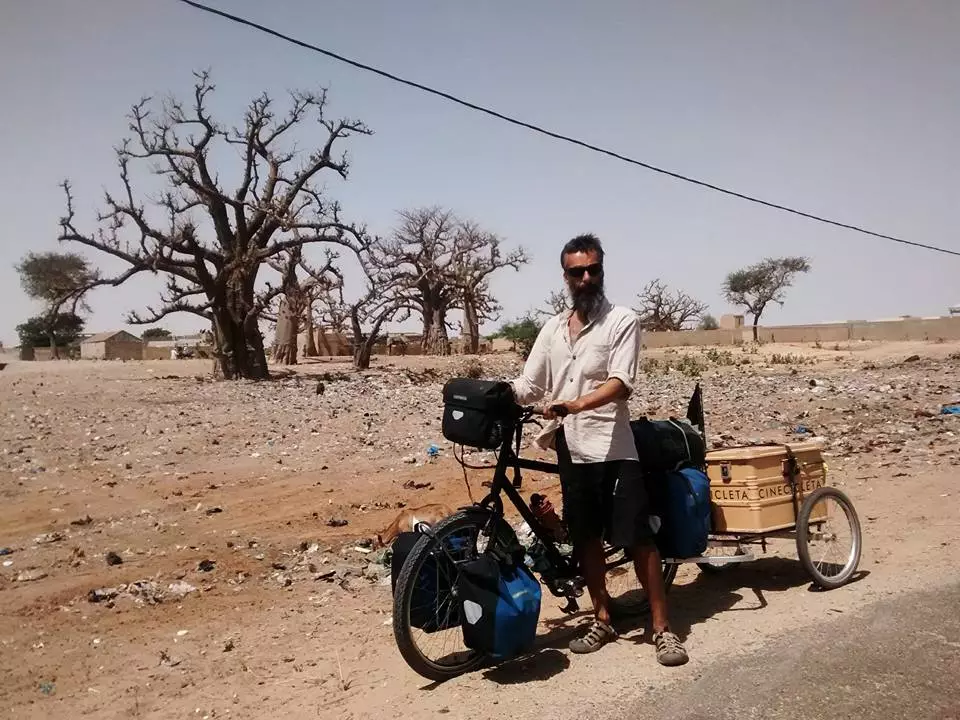
Carmelo, half of Cinecicleta
Why by bike?
carmel - I think that the bike is absolutely unique ; it can only be surpassed by walking, which seems to me another of the ideal ways to travel. Everything has its pros and cons: it's not cool to pedal at 45ºC or with sandstorms or under a universal deluge; but the bicycle allows you to be in contact with nature and has the perfect speed to get to know countries, towns, cultures and people.
And why Africa?
Carmelo - For several reasons: 1. We could leave home by bicycle without having to take a plane. 2. We thought Africa was pretty flat; although now we have verified that it is not entirely so, and the mountains choke us! 3. Africa is an incredible continent to learn from a reality very different from ours; It's like another planet. Four. Africans have it more complicated to access education and culture , and we wanted them to enjoy the cinema in places where there is hardly any electricity. It is incredible to see the surprise and fascination on their faces!
Isabel - If we are already dazzled before a screen, imagine someone who has not had any previous cinematographic experience. Often when a movie ends, the little ones run to touch the wall where it has been projected , as if to say: what is this? Where do the drawings come from? The first time we saw it we were amazed.
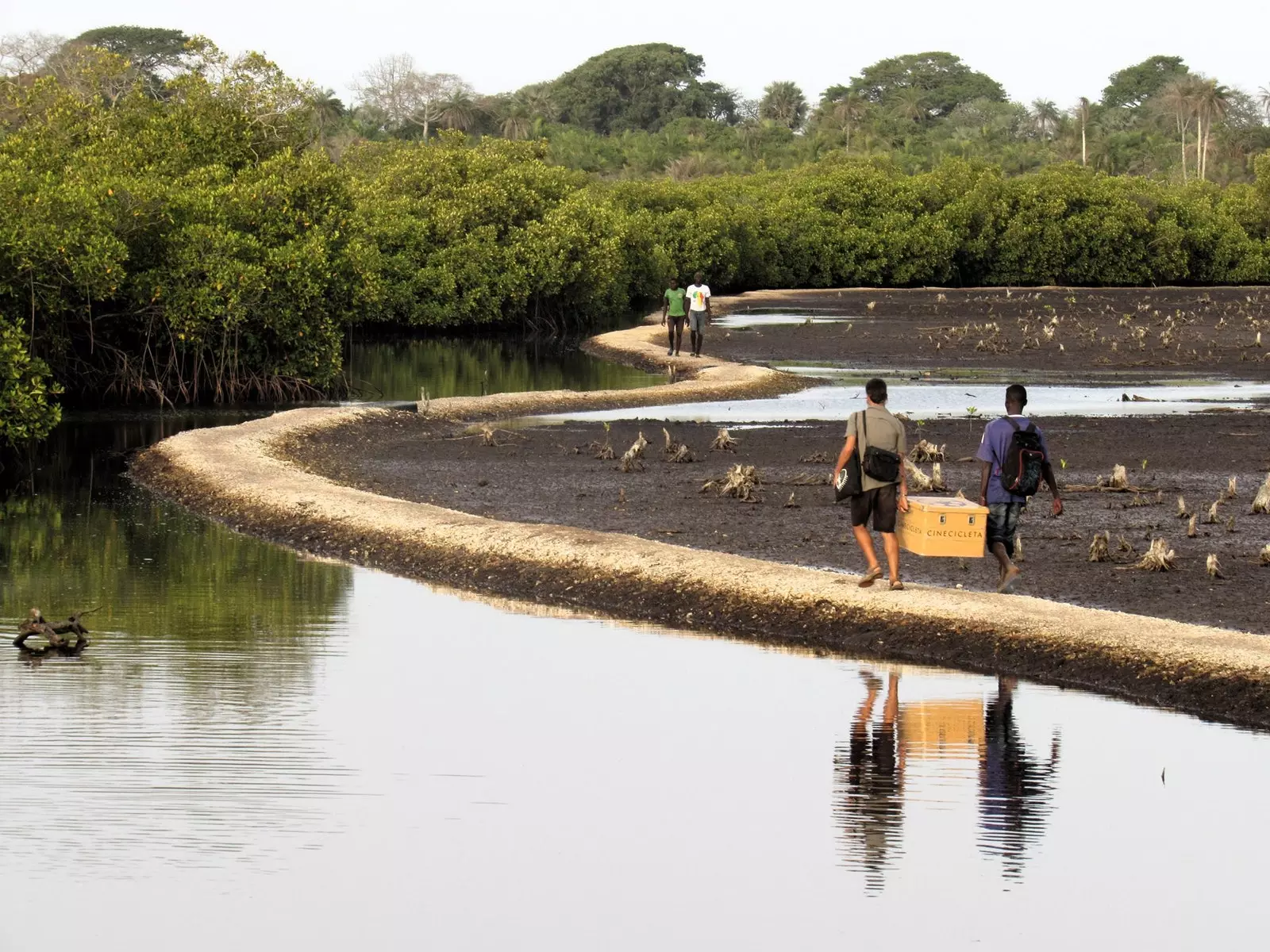
Carmelo and Isabel travel through African landscapes carrying the Seventh Art on their bicycles
What have been the most emotional sessions so far?
Isabel - The experience we had in Saint Louis was brutal . We first projected for women and adolescents incarcerated in prison. And then for talibés children, children who study in Koranic schools but who are often exploited by the marabouts (spiritual leaders) and forced to beg in the streets. It was at La Maison de la Gare, a center where they are given educational support, clothes and food, and they also play with them, which is what they need most. We were like a hundred people in a tiny room, with incredible heat. It was impressive, there were kids crying with laughter!
What movie has made him successful?
Carmel - Binta and the great idea is of course our star film – a short film by Javier Fesser shot in Casamance , on the importance of education in childhood.
Isabel - We projected it in a neighborhood in Nouakchott for domestic slave girls who, of course, do not go to school; At the end of the short, a small debate was created and there were two girls of sixteen or seventeen who decided to go back to school. Imagine the high it gave us! And that has been achieved by Javier Fesser.
Binta Y La Gran Idea (2004) Short Film from toto on Vimeo .
Carmelo - They have also loaned us movies Isabel Coixet, Juan Laguna, Patxi Uriz or Coke Riobóo ; In addition, we show a lot of silent films, animation films, and local African films, as close as possible to the viewer.
What African films would you recommend us?
Carmelo - Some of our favorites are: Timbuktu, Bamako Y In attendant le bonheur , by Abderragmane Sissako; C'est eux les chiens , by Hisham Lasri; The petite soleil sale, by Djibril Diop Mambéty; Now the street , by Moustapha Dao; miners shot down , by Rehad Desai; Beasts of the Antonov, by Hajooj Kuka, or princess of africa , by Juan Laguna.
The spectators of the Cinecicleta have to pedal so that the magic of the cinema starts. How does your cinematograph work?
Isabel - It's a pedal cinema . It consists of a stationary bicycle without handlebars that generates energy with pedaling. It is necessary to pedal throughout the film, usually someone from the audience, but so that they do not get tired, they take turns of five or ten minutes. The bottom bracket is connected to the speaker and the media player, and instead of carrying a battery, which weighs a lot and also pollutes, we have ultracapacitors, which are much lighter.
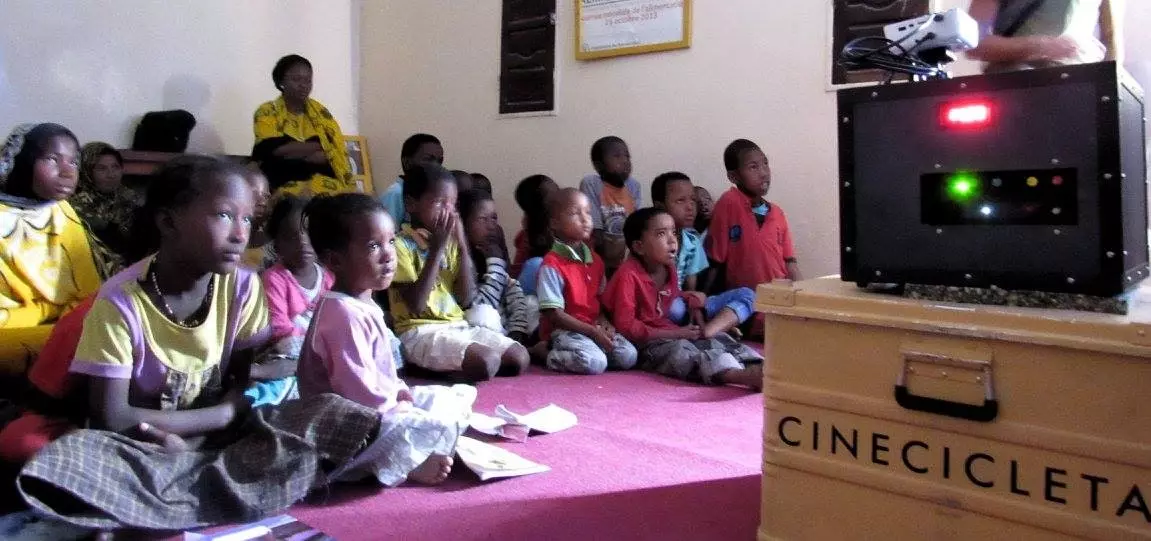
The pedal cinema fits here
Are your saddlebags very loaded?
Isabel - Apart from the Cinecicleta, which goes in a car behind and weighs 45 kilos , we take the clothes, the sleeping bags, the tent, mats, the tools and spare parts for the bike, a large medicine cabinet, the kitchen, the food, the water, three cameras, a computer, chargers, three discs hard, two tripods… We look like two little snails! Carmelo's bike weighs about 90 kilos and mine about 65.
Carmelo - It's crazy all the weight we carry, goes against any cycle-traveling rule . I have traveled by bicycle through twenty countries on five continents, and never before have I carried so much luggage. You always have to reduce go as light as possible.
Elizabeth - Oh! And the height of the weight: we carry a pressure cooker, because we are vegetarians , so that we never lack our rice and our lentils.
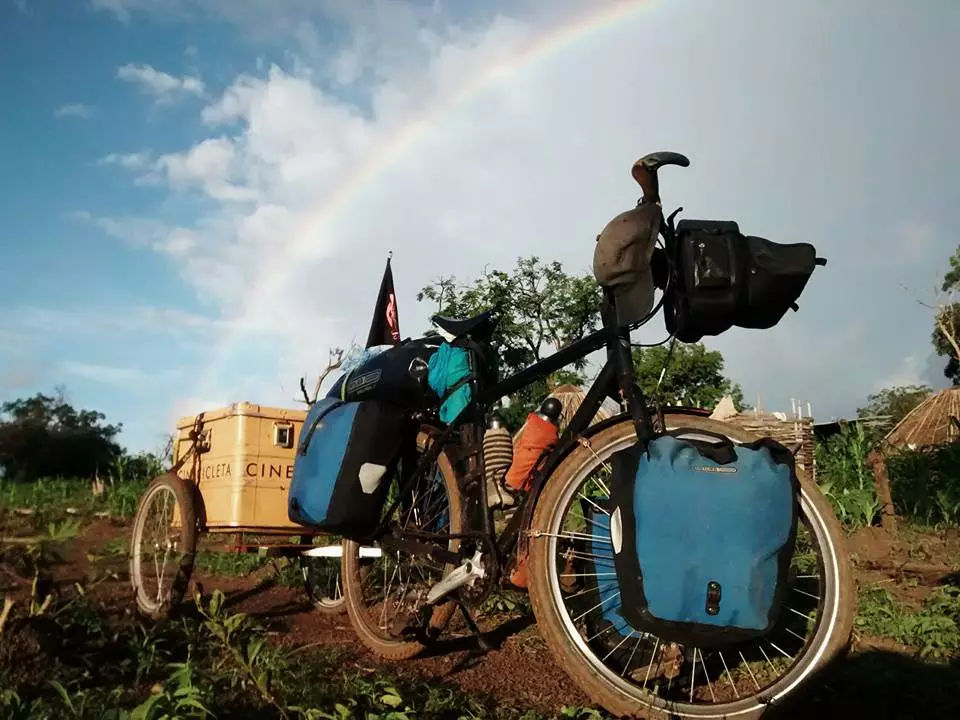
This bike fits a cinema, a bed and a pressure cooker
How is the food? What is the best delicatessen you have tried?
Isabel - It depends a lot on the region and the country, but the variety is very scarce. There are hardly any carrots or green peppers to be seen; well, neither green nor red; and when you find them in the market they are so expensive that, sometimes, the pieces are sold by the quarter. when we were in Guinea Conakry there were only eggplants; now it has been corn season and there were some grilled cobs. But the best are the mangoes , go down the road and take them directly from the tree; we could eat six or seven of those grandees a day. The fried sweet potato cut into wedges is also very tasty, and some mashed cassava croquettes that they make in Guinea, very good. Or the baobab juice , monkey bread or juice de bouy, as they call it. And the foli, which is like a super sour orange, but it is delicious if you add sugar or drink it in juice.
What customs have caught your attention?
Carmelo - To bad, man's contempt for woman.
Isabel - Sexist situations are the order of the day. And it's kind of scary, because you see them so often that you almost normalize them. Until Guinea Bissau or the south of Senegal, we didn't see girls riding a bicycle, because it is frowned upon and they are told that they can lose their virginity. Some men did not believe that I had come pedaling from Madrid, They asked us if Carmelo was pulling me with a rope! Many villages look like villages of men, you don't see women on the streets, because they are at home or working in the rice fields, and without oxen! I say oxen as if it were something super modern, but forget about tractors and plows there. As it is such a hard physical job and requires so much time, there are years that they have not planted rice because there was not enough and they have suffered problems of scarcity.
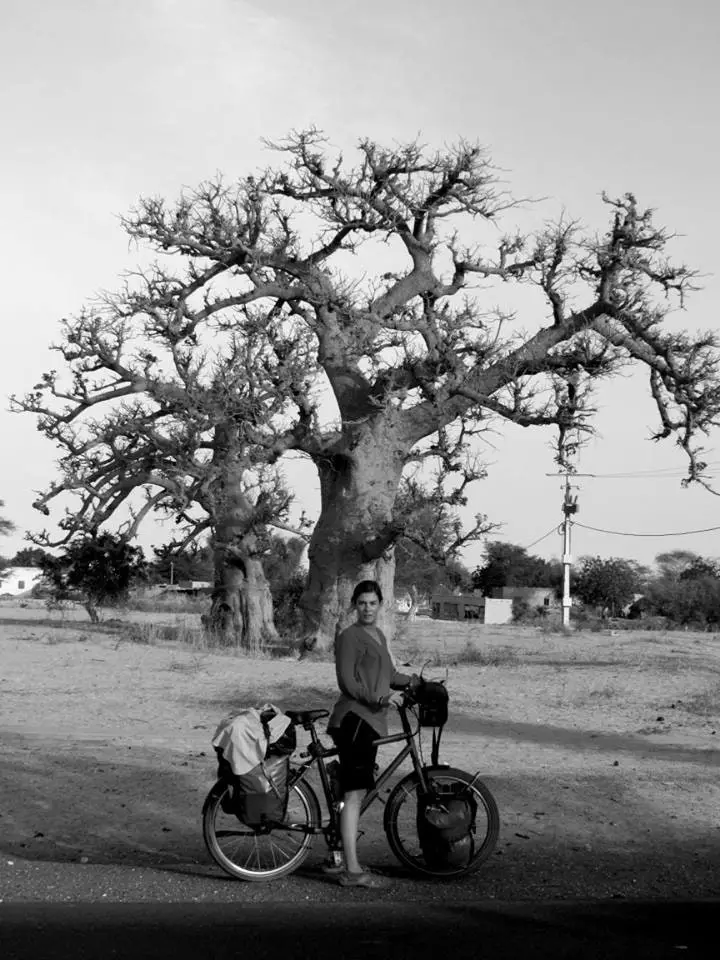
Baobab juice, the daily diet of Cinecicleta
And meanwhile, the husbands smoking and drinking tea…
Isabel - In some ethnic groups, men only work in those activities that bring them direct money , like selling cajús (cashew nuts) on the road. They see women as labor, as women-objects. The Mauritanian Moors, for example, send them to the desert to fatten them when they are little; there they like meat and beautiful appetizers, and force them to eat couscous and dromedary milk; if not, they pinch their feet and hands with pliers. It's crazy. But for them, the gavage is a tradition.
Carmelo - Here, everything that is traditional saves men's asses and pisses off women.
Isabel - Then there is the female genital excision, the forced marriages, the repudiation of women who have had children out of wedlock... There are day-to-day customs that, even if you don't understand, for education and coexistence, you respect them. But I decided not to abide by those that entail gender discrimination. For example, women smoking is frowned upon, but I light my cigarette in front of them, because I don't think it's fair.
Carmelo - We do not intend to impose our way of seeing things, we only give our point of view. And it seems to us that the only thing that sustaining certain traditions achieves is to affirm the power of men over women..
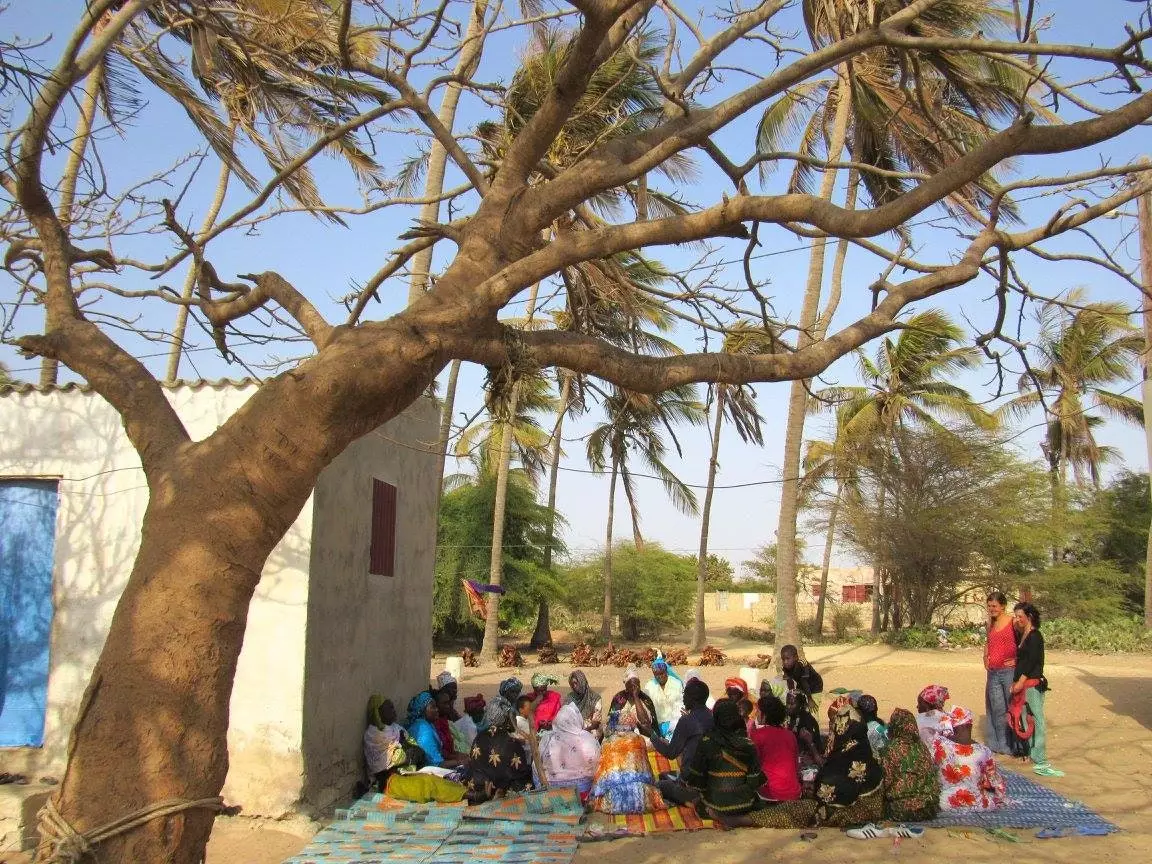
A day of cinema in Gandiol
And a custom that you would import to the West?
Isabel - The Solidarity.
Carmelo-I love his phrase " Nous sommes ensemble ”, we are together, we are in this together, on Earth, in life. And the most wonderful thing is that they put it into practice. Think that, in fourteen months that we have been traveling, we have only paid accommodation for five days.
Isabel - We ask where to sleep and they invite us to their houses directly; I think we are carrying the tent foolishly.
Carmelo - This happens mostly in Islamic countries, because hospitality is an obligation of Islam . It is incredible that you stop to eat under an acacia tree in all the heat and a person comes out of nowhere to offer you fresh water and a mat. It is of a humanity and a generosity that seems from another world . In Mongolia, in the Nordic countries, in Canada and above all in Iran, they are also very kind to foreigners; but Africa is special, they will welcome you in their house even if they only have a mango for dinner ; I had never come across anything like it. Although it is true that we circulate in rural areas where the population is always closer; in the more touristy areas, on the other hand, you are only persona grata if you drop dough. As it happens all over the world.
in Bamako, Carmelo was hospitalized for a few days. Have you already recovered from malaria?
Carmelo - I'm weak, but I feel much better. I guess I must have caught her in Guinea Conakry. I followed all the recommendations and got all the vaccinations before leaving Madrid, but you can't take antimalarials during such a long trip, no liver can take it.
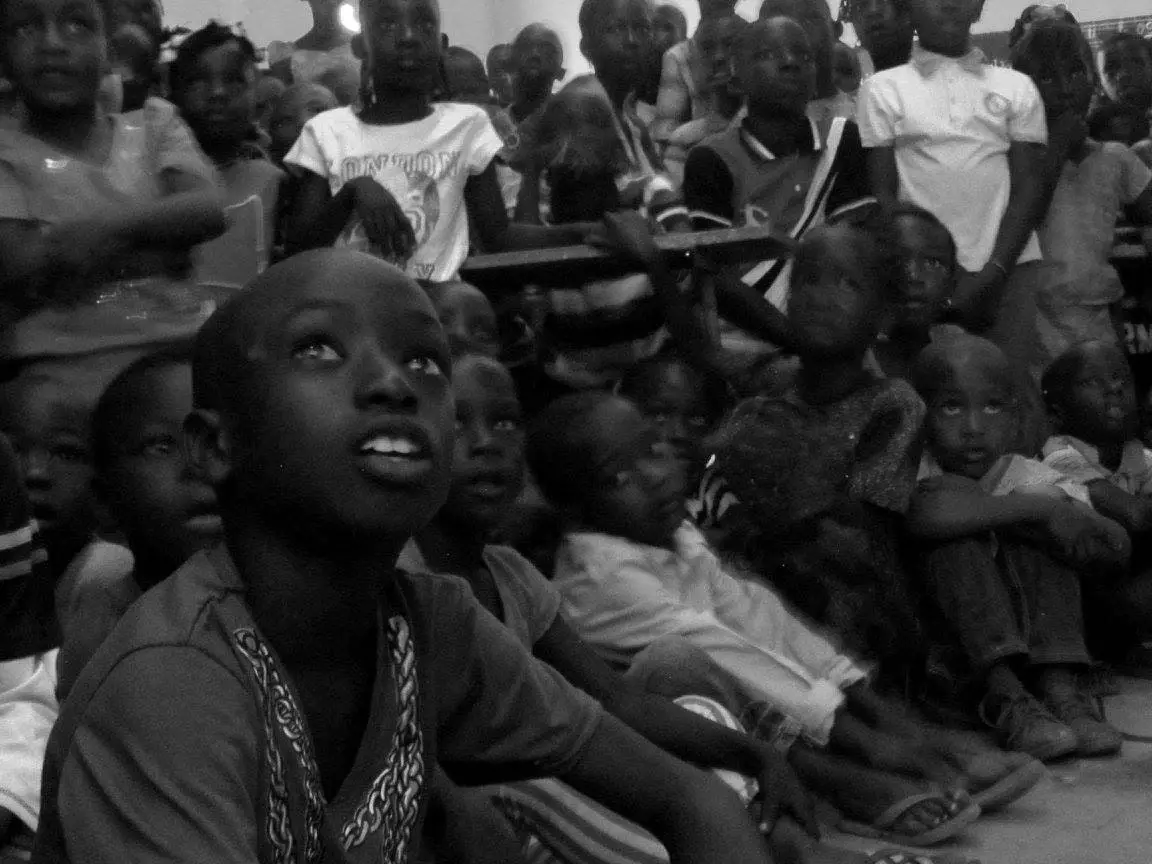
This is the look of someone who sees a movie for the first time
Practical advice to combat anopheles mosquito.
Isabel - You have to act quickly, and as soon as you hesitate to get tested for malaria.
Carmel - It is also good to take to Spain the specific antimalarials from the country where the disease has been contracted ; since it has between fifteen and twenty days of incubation, you can bring the virus home, and if you notice the symptoms in Spain you have screwed it up, because here they are not used to treating malaria.
Isabel - In addition, they say that the symptoms are accentuated when you take a plane, I don't know if it is due to the pressure, but it seems that your defenses are lowered...
Carmelo - I have a rather weak immune system… I catch everything!
Isabel - With the theme of the hospital, c So we have spent more spending a week in Bamako than in everything we have taken on a trip.
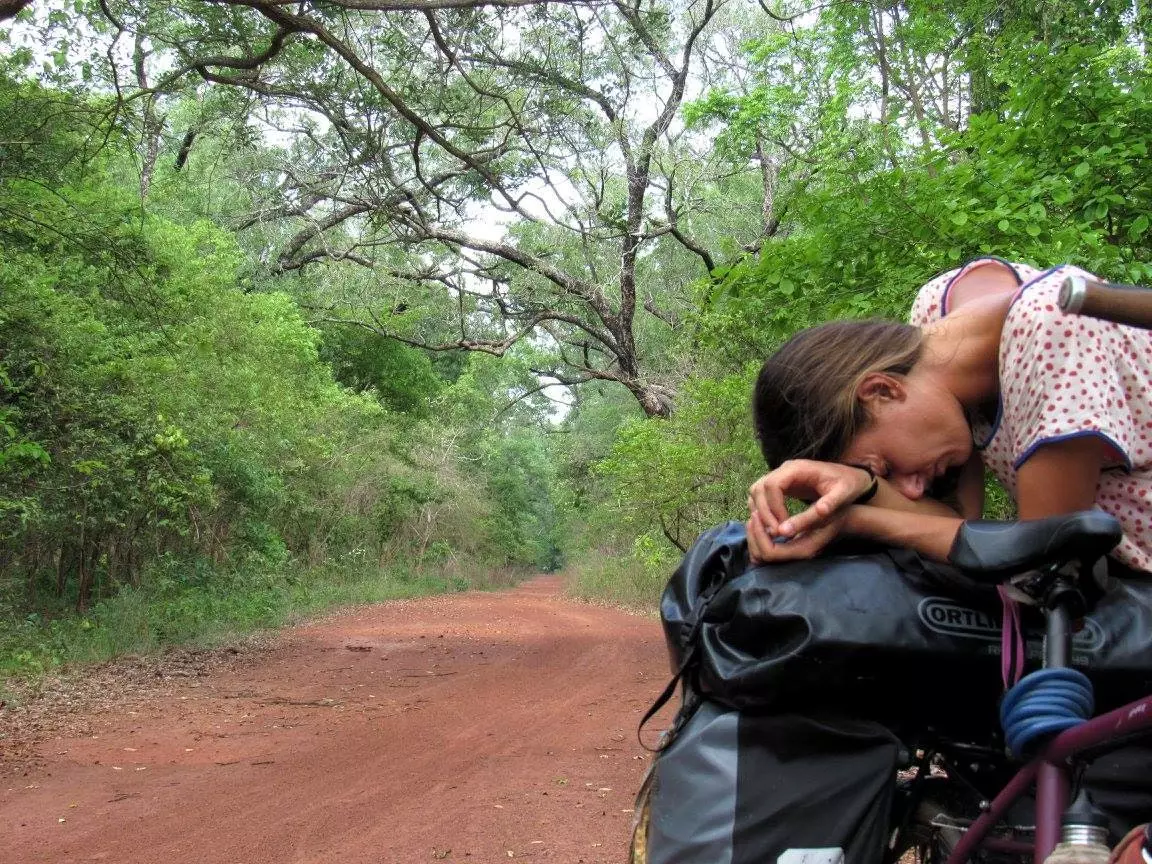
Fatigue and heat is part of the journey
How much did you have to save for this trip?
Carmelo - The project goes ahead mainly with its own financing, in addition to donations from friends, family and anonymous. We've been working all kinds of jobs without vacations—he's a swimming teacher; she a forestry engineer. In this way we managed to save enough to be free and not pull sponsors who directed our dream. There was some other multinational that made us an offer of big money, but we rejected it, because it did not seem honest to us to carry advertising for those big soft drink and oil companies that are at the opposite pole of our thinking. We are dry, so whoever wants to collaborate in the project is welcome. There is an account number on our website. Donations will serve to lengthen the trip and make as many screenings as possible.
How long will you be pedaling through Africa?
Isabel - In principle, the idea was to be traveling for two years. But if all goes well, we'll drag it out a little longer. We will leave for Burkina Faso, Togo, Benin... And then we'll see. We would like to reach Madagascar.
Carmel. Hopefully, hopefully we can get to Madagascar! , complete the project and enjoy the three months that the visa gives us. But that is an entelechy, it is still a long way off. We plan the journey day by day, pedal stroke by pedal stroke, until the parné runs out.
Follow @meritxellanfi
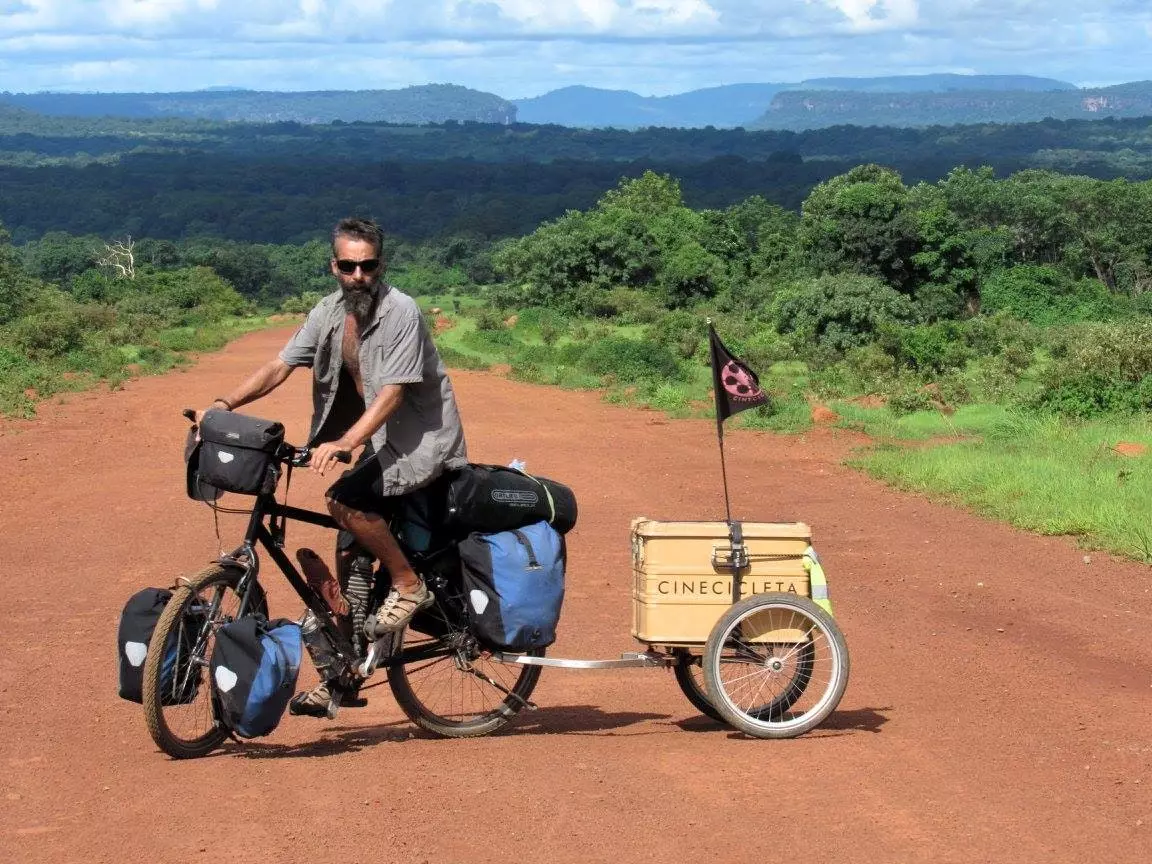
The idea: pedal for two years
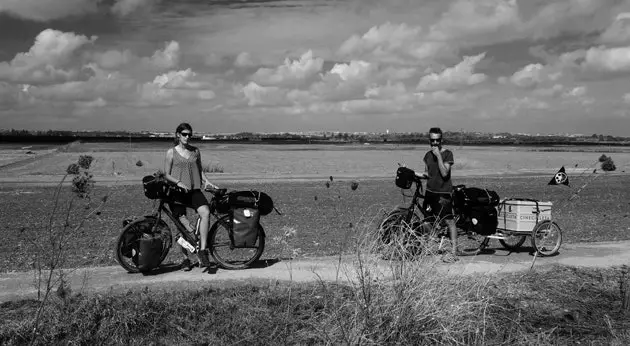
Photo from the beginning of the adventure, still in Spain
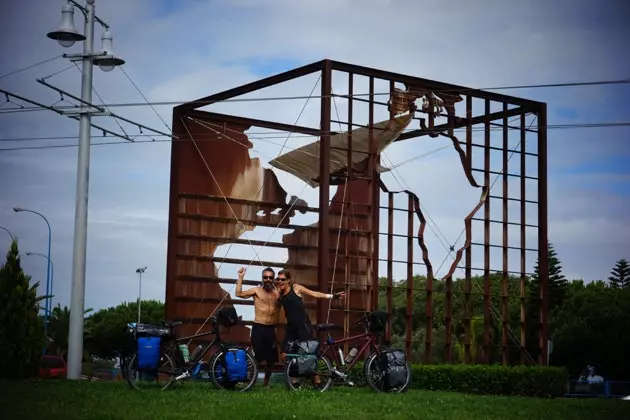
Target: Africa
